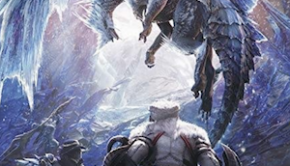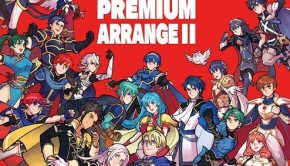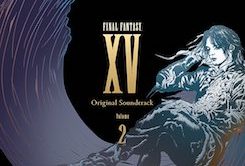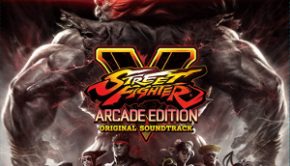Monster Hunter: World Original Soundtrack
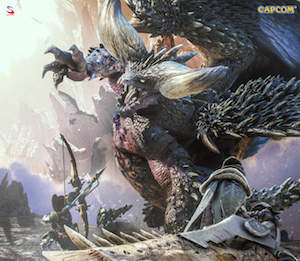 |
Album Title: Monster Hunter: World Original Soundtrack |
| Record Label: Suleputer | |
| Catalog No.: CPCA-10447~9 | |
| Release Date: February 14, 2018 | |
| Purchase: Buy on iTunes |
Overview
Monster Hunter: World may yet be young on PS4 and XB1 – and practically newborn this month on PC – but the latest entry in Capcom’s beast-battling franchise has already proven to be the most triumphant. The series has come a long way from its humble roots, selling steadily these days to a crystallizing western fanbase. What’s more, Monster Hunter: World marks the return of the franchise to Playstation home consoles, and in beautiful HD fashion to boot.
All of which has made 2018 an exciting time for orchestral game music lovers, because Monster Hunter has a track record of delivering some of this industry’s most impressive soundtracks. Blending diverse instrumentation with intricate composition, Monster Hunter has earned itself a musical reputation as glorious as the fanfares and battle themes it thrusts our way. Can Capcom’s latest success story continue the trend and elevate the music of Monster Hunter to heights?
Body
At the core of every great Monster Hunter score is a rousing cinematic theme to call all hunters to arms. Monster Hunter: World’s “Main Theme – Stars At Our Backs” is no exception. What begins as a delicate orchestral awakening soon crescendos into a soaring anthem as memorable as any Monster Hunter theme that came before it. From there, the track is off to the races with deep, galloping percussion and sweeping orchestration. The sound is classic Monster Hunter, tinged with sentimentality and exuding bravery and beauty.
As might be expected of a beefy orchestral score, the main theme returns on more than a few occasions to varying degrees, serving to tie the album together. The first area fanfares on the album, both day and night variants of “The New World Before My Eyes,” send the strings gliding over the vast expanse yet to be explored, all to the tune of the main theme’s chorus. The frolicsome and festive “Celestial Pursuit – Bustling Heavens” turns briefly pensive as it makes a subtle allusion to the main theme via flute, and “On Sale Now!” eventually works its way to a sweet string rendition of the melody after a peppy pairing of staccato articulations and steel drum blips. Two victory fanfares share the album this time around, and with one modeled after Monster Hunter’s long-running “Proof of a Hero” theme and the other fashioned from Monster Hunter: World’s own theme. Even the first handful of notes from track one prove their worth in the solemn, almost Jeremy Soule-esque “Journey to the Truth.” Nowhere do they make a more forceful impression, however, than in “Beast with Fire Upon Its Back – Zorah Magdaros,” where they are reforged in menacing style, complete with occasional parallel fifth melodic backing and even a snippet of pipe organ.
Even these few tracks by themselves demonstrate a key reason why Monster Hunter soundtracks are so special: they counterbalance the grandiose and the epic with inventive, lighthearted play. For every “Council Meeting” track on the album – each raising the stakes and tension a little higher than the last – there’s a musical cue like the frenzied “Meowscular Chef’s Custom Platter” or the stampeding “Tailraider Safari, Go!” to set the album back in a jovial mood. The intrinsic playfulness of these tracks is often due to the tactile feel lent to them by a clever choice of percussion: the tiny metallic clamor behind “Eat Up!,” for example, is as evocative of clanging kitchenware as can be.
These high energy joyrides are themselves counterbalanced by a handful of clam and reflective tracks across the album. “Preparing for the Journey – Living Quarters” achieves such zen that no instrument calls attention to itself, despite the unique combination of bouzouki, flute, and even accordion. “Dreams of Tomorrow – Private Quarters” frequently lets its reworking of the main theme fall to the wayside, giving way to clacking woodblocks, pizzicato, and quite possibly a bit of self-reflection after a long hunt. “Gorgeous Days – Private Suite” practically transforms the main theme into a precious lullaby with harp, choir, and a wonderful lilting cello. The contrast between the mellow and the chipper can occasionally be found even in the same track: “Cornerstone of the New World – Astera” navigates the transitions between its bombastic, punctual melodies and elongated, restful phrases without friction.
When it comes to Monster Hunter: World’s battle music, however, friction is everywhere by design. This time around, encounters with littler creatures are dignified with battle themes of their own rather than silence; and perhaps Capcom took a cue from Breath of the Wild here, because these battle themes are eclectic more often than not. This is especially true of the “Small Monsters Abound” tracks on the album, comprised mainly of scrambled chromatic riffs and dissonant orchestral stabs. Thankfully, the album manages to bring even these unruly tracks into focus with thorough organization. The way the album is structured, all tracks pertaining to a certain area of the game will play back to back, with day and night iterations of each area’s musical cue preceding small and medium “Monsters Abound” battle themes. Since the same musical DNA runs through each track for a given area, even the most calamitous “Small Monsters Abound” tracks pose little threat of bucking listeners off the narrative.
Monster Hunter: World’s structure serves one other important purpose as well: the transition from area introduction tracks to battle tracks makes for an effective crescendo to the boss monster tracks. These gargantuan battle themes are the heart and soul of any Monster Hunter album, and Monster Hunter: World succeeds in keeping the tradition of larger than life combat themes alive. Better yet, each boss battle theme serves as an amalgamation of motifs and timbres from the environment and battle themes that came before – and thanks to keen instrumentation and synthesis decisions, these boss tracks have rainbows of interesting color to work with.
“Savage of the Ancient Forest” boasts Monster Hunter’s iconic pairing of blaring trumpets and tremorous drumming, while “Rulers of the Wildspire” rollicks along with swagger and syncopation. “Dancer in the Coral Highlands” employs brittle sounding percussion to evoke an image of coral, while “Murmurs from the Land Forbidden” disrupts the Monster Hunter’s earthly sound palette with groovy organ riffs. “Forces of Land and Life” is particularly strong thanks to its icy synth work and stark chord progressions. Each track supplies plenty of action alone – but in a twist unique to Monster Hunter: World, each boss monster track is immediately followed up with a welcomed “Chase” variation that keeps the action going a little longer.
Once “How Life Springs Anew” brings the combative chaos of the album to a close, “Guidance” delivers yet another stunning vocal performance for the franchise courtesy of the series’ mainstay performer Ikuko, with an extended sendoff on the “Proof of a Hero” theme to follow. The album concludes with a riveting return to the Monster Hunter: World main theme in “Pride of a Nameless Hunter.” The invigorating pace and energy in this track make it a stellar finish for the album – albeit an odd one, since the track loops twice and then fades rather than giving the soundtrack the definitive conclusion it deserves.
Summary
Any qualitative comparisons to previous Monster Hunter soundtracks would be difficult: Monster Hunter music has never really been lacking in quality, and the musical direction has been so consistent that different soundtracks in the series often feel like one body of work when put together. At the very least, Monster Hunter: World is yet another pristine addition to that catalogue. The score is imaginative, dynamic, and practically flawless.
All of which makes Monster Hunter: World’s record-setting sales great news. The more fresh ears there are for this music, the better.
Do you agree with the review and score? Let us know in the comments below!
5
Posted on August 14, 2018 by Reilly Farrell. Last modified on August 14, 2018.

